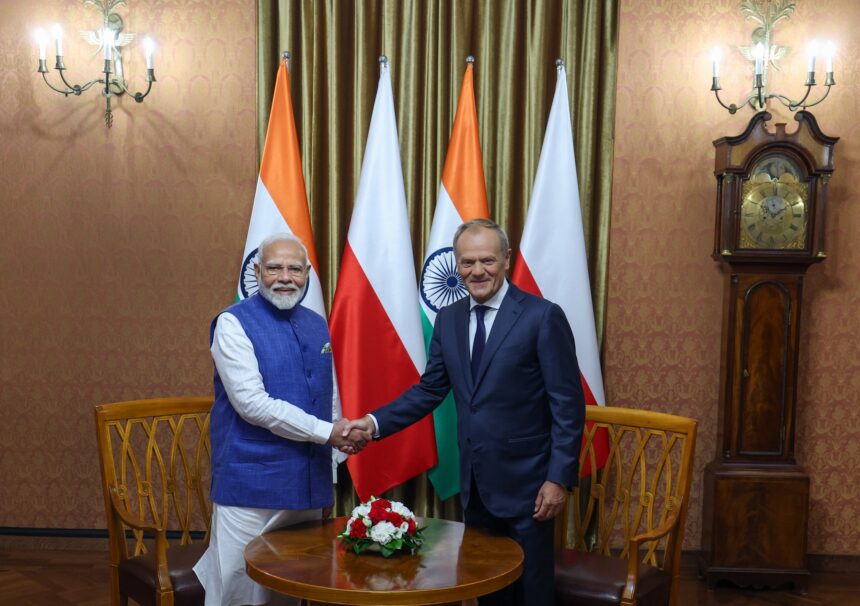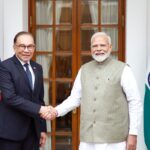*Warsaw, Poland* – In a landmark diplomatic engagement, Indian Prime Minister Narendra Modi and Polish Prime Minister Donald Tusk convened a highly productive meeting in Warsaw, marking a significant step forward in India-Poland relations. The meeting, held on August 20, 2024, was a critical platform for both leaders to explore and solidify cooperation in pivotal sectors such as food processing, artificial intelligence (AI), energy, and infrastructure. Additionally, the two nations have reached a landmark agreement on social security, which promises to enhance benefits for their citizens.
Diplomatic Synergies and Strategic Alliances
The meeting between Modi and Tusk underscored the growing strategic partnership between India and Poland. Both leaders expressed their commitment to deepening bilateral relations, recognizing the vast potential such collaboration holds for their countries.
Food Processing
One of the key areas of focus was food processing, a sector where both nations see substantial opportunities for mutual growth. Poland, known for its advanced agricultural practices and food technology, and India, with its vast agricultural base and emerging food processing industry, have identified significant synergies.
Poland’s expertise in food safety, technology, and efficient supply chain management aligns with India’s growing needs in these areas. The leaders discussed various initiatives, including technology transfers and joint ventures, to enhance India’s food processing capabilities. This cooperation is expected to improve food security, better quality products, and increased economic opportunities for both nations.
Artificial Intelligence
Artificial Intelligence emerged as another focal point of the discussions. India has made significant strides in AI research and development, with a burgeoning tech industry that has gained global recognition. Poland, on the other hand, is rapidly evolving as a hub for innovation in the tech sector.
Modi and Tusk explored collaborative projects that would harness the strengths of both countries. The agreement includes joint research initiatives, the development of AI applications for various sectors, and exchange programs to foster talent development. This partnership aims to position both countries at the forefront of AI advancements, fostering innovation and creating new opportunities in the tech industry
Energy
Energy cooperation was a crucial topic, reflecting the global shift towards sustainable and renewable energy sources. India and Poland have both committed to enhancing their energy security and transitioning to greener energy solutions.
The leaders discussed various collaborative projects in renewable energy, including solar and wind power. Poland’s experience in energy diversification and India’s ambitious renewable energy targets create a fertile ground for cooperation. Joint ventures in energy infrastructure, technology sharing, and investment in sustainable projects are set to become key areas of collaboration. This partnership will not only help in meeting both countries’ energy needs but also contribute to global climate goals.
Infrastructure Development
Infrastructure development, particularly in transportation and urban planning, was another significant agenda item. With India’s rapid urbanization and Poland’s advancements in infrastructure projects, both nations are keen to share best practices and technological advancements.
The discussions highlighted the potential for collaboration in building smart cities, improving transportation networks, and developing sustainable infrastructure solutions. By leveraging Poland’s expertise in modern infrastructure and India’s large-scale development projects, both countries can enhance their infrastructure capabilities and foster economic growth.
Social Security Agreement
In a move that reflects a deeper commitment to the well-being of their citizens, India and Poland have agreed on a new social security agreement. This landmark accord aims to provide greater benefits and protections for individuals who work in both countries, enhancing their social security entitlements.
The agreement addresses issues such as pension contributions, unemployment benefits, and healthcare coverage for workers who move between India and Poland. By aligning their social security systems, both nations are ensuring that their citizens will have access to a more comprehensive and seamless safety net, regardless of where they are employed.
Strategic Importance and Future Prospects
The meeting between Modi and Tusk represents a pivotal moment in India-Poland relations, reflecting a shared vision for a prosperous and collaborative future. The agreements reached in key sectors underscore the strategic importance of this partnership and set the stage for further engagement and growth.
The enhanced cooperation in food processing, AI, energy, and infrastructure not only benefits the two nations but also has the potential to create ripple effects in the global economy. By combining their strengths and resources, India and Poland are positioning themselves as significant players on the international stage.
The social security agreement is a testament to the growing people-to-people connections and the commitment of both governments to improving the lives of their citizens. This move is expected to strengthen ties between the two countries and facilitate greater mobility and opportunity for their respective workforces.
Conclusion
The meeting between Prime Ministers Narendra Modi and Donald Tusk in Warsaw marks a new chapter in the evolving relationship between India and Poland. The discussions and agreements reached during this high-level engagement reflect a shared commitment to addressing global challenges and seizing opportunities for mutual growth.
As India and Poland move forward with their collaborative initiatives, the focus on key sectors like food processing, AI, energy, and infrastructure will pave the way for a more dynamic and interconnected future. The social security agreement further underscores the depth of the partnership, ensuring that the benefits of this collaboration extend to the citizens of both nations.
In the coming years, this strengthened partnership is poised to deliver significant economic, technological, and social benefits, reaffirming the importance of international cooperation in an increasingly interconnected world.







